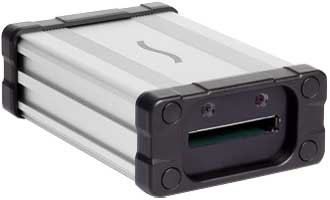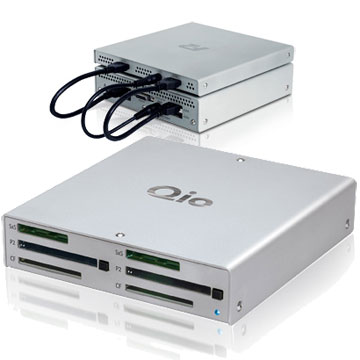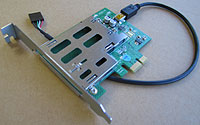Updated Sony Driver Transforms Sonnet's Echo ExpressCard Adapter Fastest and Least Expensive SxS Memory Card Reader with Thunderbolt Technology
 Sonnet Technologies announced on April 16, 2012 that the Echo™ ExpressCard® Thunderbolt™ Adapter, which enables the use of many Sonnet ExpressCard/34 cards with computers equipped with a Thunderbolt port—including the latest Apple® iMac®, Mac® mini, MacBook Air®, and MacBook® Pro models—can now function as an SxS™ memory card reader. Sonnet supported Sony® in its work to create a Thunderbolt technology-compatible Mac OS® X driver to enable this functionality. This updated driver also enables full functionality of Sonnet’s Qio™ E3 professional SxS media reader, when connected through the Echo adapter to a computer with a Thunderbolt port.
Sonnet Technologies announced on April 16, 2012 that the Echo™ ExpressCard® Thunderbolt™ Adapter, which enables the use of many Sonnet ExpressCard/34 cards with computers equipped with a Thunderbolt port—including the latest Apple® iMac®, Mac® mini, MacBook Air®, and MacBook® Pro models—can now function as an SxS™ memory card reader. Sonnet supported Sony® in its work to create a Thunderbolt technology-compatible Mac OS® X driver to enable this functionality. This updated driver also enables full functionality of Sonnet’s Qio™ E3 professional SxS media reader, when connected through the Echo adapter to a computer with a Thunderbolt port.
High-performance SxS memory cards are used in Sony’s popular XDCAM® EX™ line of professional HD camcorders and the ARRI® ALEXA line of digital cameras, and share the same form factor and connector as ExpressCard/34 adapter cards. These shared traits make ingesting footage from SxS media a quick, simple task in ExpressCard slot-equipped notebook computers. In any other situation, this process requires the use of a specialized media reader, such as Sonnet’s Qio™ pro media readers with multiple SxS slots for speedy file offloads. With the added capability to read SxS, SxS Pro™, and SxS-1™ cards, the Echo ExpressCard Thunderbolt Adapter instantly becomes the least expensive high-speed SxS memory card reader available, enabling Thunderbolt technology-equipped Mac computers to read SxS cards at over 100 MB/s.
When used with the Echo ExpressCard Thunderbolt Adapter, users can connect Sonnet’s Qio E3 professional SxS media reader, with its ExpressCard/34 interface card, to compatible computers with a Thunderbolt port. This setup supports concurrent data transfers from SxS memory cards in all three slots for even faster file ingest speeds.
“With the installation of Sony’s Thunderbolt technology-compatible driver for Mac OS X, Echo ExpressCard Thunderbolt Adapter users gain the ability to ingest footage through a small, rugged adapter using the latest I/O technology to improve workflow speeds significantly,” said Robert Farnsworth, CEO of Sonnet Technologies. “This new driver benefits users of our Qio E3 professional media reader, enabling them to connect their readers to Thunderbolt technology-equipped computers through the Echo ExpressCard adapter and ingest footage from multiple SxS memory cards at the same time.”
Developed by Intel® and brought to market with technical collaboration from Apple, Thunderbolt technology supports high-performance data services and high-resolution displays through a single compact port. The Echo ExpressCard Thunderbolt Adapter supports PCI Express technology with 2.5 Gbps throughput in both directions. The Sonnet adapter connects directly to a computer or at the end of a Thunderbolt device chain with a Thunderbolt cable, which is available at the Apple Store®.
“Thunderbolt delivers unparalleled performance, flexibility and simplicity to personal computing.” said Jason Ziller, Intel’s director of Thunderbolt marketing. “The Sonnet Echo ExpressCard Thunderbolt Adapter and Qio E3 help highlight what Thunderbolt technology makes possible.”
The Echo ExpressCard Thunderbolt Adapter—part number ECHO-E34—is compatible with all Apple computers running Mac OS X that are equipped with Thunderbolt ports. It is available now at a suggested retail price of $149.95 through Sonnet and Sonnet resellers.
A link to the driver is below. It says nothing about the Thunderbolt compatibility on the downloads page. As of this morning, the actual version of the driver that gets downloaded is 1.1.0.03142 (even though the text on Sony's site says "Latest Version for Mac : Ver:1.0.52020") http://pro.sony.com/bbsc/ssr/cat-recmedia/resource.downloads.bbsccms-assets-mkt-recmedia-downloads-upgrades.shtml




